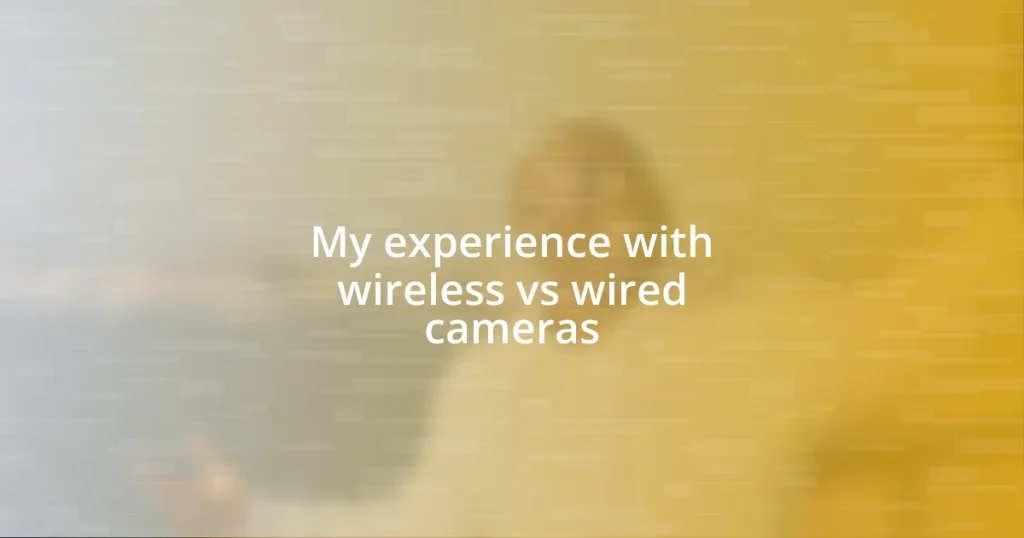Key takeaways:
- The author initially preferred wireless cameras for their convenience but faced reliability issues during critical moments, leading to a shift towards wired cameras.
- Wired cameras provided superior video quality and reliability, with the author appreciating their low maintenance and long-term cost-effectiveness despite higher initial costs.
- The decision between wireless and wired cameras ultimately hinges on individual needs, with the author emphasizing the importance of reliability and stability in security systems over mere convenience.

My journey with camera types
When I first started exploring security cameras, I was drawn to the sleek design of wireless models. It felt liberating to imagine a setup without the hassle of cords; I remember unboxing my first one and eagerly placing it on my wall, thinking how effortlessly it blended into my living room decor. Have you ever felt that thrill when trying something new? For me, it was a mix of excitement and anticipation.
However, my journey took an interesting turn when I encountered wired cameras. Initially, I found them intimidating with their tangle of cables, but once I installed one, I was captivated by the reliability of a constant power source. I can still recall that moment of clarity, watching the footage and realizing that wireless might not always be the best option for every situation. Isn’t it fascinating how sometimes, embracing a challenge can lead to unexpected rewards?
As I continued to explore both types, I noticed how my preferences began to shift based on my needs. I remember a rainy night when my wireless camera lost connection, leaving me anxious about my home’s security. That experience taught me that while convenience is appealing, sometimes the old-school reliability of wired systems has its irreplaceable benefits. Have you ever faced a moment that changed your perspective on something you thought you knew?

Understanding wireless camera features
Understanding wireless camera features can really enhance your security experience. From my own experience, I found the range of features to be impressive. Many wireless cameras allow for remote viewing, giving you the ability to check in from anywhere. I still remember the first time I was on vacation, pulling out my phone to check my front porch, and feeling a wave of relief seeing everything was safe.
When I dug deeper into their features, I discovered several key functionalities worth considering:
- Two-way audio: This feature lets you speak through the camera, which can be handy to communicate with delivery drivers or warn intruders.
- Motion detection: Wireless cameras often come with smart motion detection that sends alerts to your phone when they detect activity, which I found comforting during late-night shifts.
- Cloud storage options: Many models offer cloud services to store footage—something I appreciated during a time when I had concerns about home theft.
- Night vision capability: This feature was a game-changer for me, allowing clear visuals even in darkness, which I needed for my backyard.
Understanding these features really opened my eyes to the potential of wireless cameras. It transformed the way I viewed my security setup, blending technology with peace of mind in ways I hadn’t expected.

Exploring wired camera advantages
Wired cameras offer several advantages that I found particularly appealing as I navigated my security setup. One of the most notable benefits is consistent video quality. Unlike wireless cameras, which can suffer from interference due to obstacles, I found that the wired models delivered clear and uninterrupted footage every time. I think of one instance where I reviewed recorded video, and the clarity allowed me to notice details I might have otherwise missed—like the license plate of a car that had lingered outside my home.
Another advantage is the straightforward installation process. I initially feared that wired camera setups would be complicated, but I discovered that once I had everything connected, they required minimal maintenance. I remember the satisfaction I felt after successfully running the cables through the walls and finally powering everything on. The reliability of a direct connection gave me peace of mind, knowing that my cameras were always operational without worrying about losing connectivity due to Wi-Fi issues.
Lastly, I found the long-term cost-effectiveness of wired cameras to be an important consideration. While they may have a higher upfront cost due to installation and equipment, I appreciated that once they were up and running, there were no ongoing subscription fees for cloud storage. This realization struck me when I calculated the potential savings over several years, leading me to feel I had made a wise investment in my home’s security.
| Advantages | Wired Cameras |
|---|---|
| Consistent Video Quality | Yes |
| Less Interference | Yes |
| Low Maintenance | Yes |
| Fixed Costs | Yes |

Comparing installation processes
When it came to installation, I quickly realized the fundamental differences between wireless and wired cameras. With wireless cameras, the appeal lies in their simplicity—just mount and connect to Wi-Fi. I remember the first time I set one up; I felt a sense of accomplishment as I adjusted it to get the optimal angle without worrying about running cables. It was almost too easy!
In contrast, installing wired cameras felt like a mini home improvement project. At first, I was daunted by the thought of drilling holes and running cables through walls. Yet, once I got into it, the process became oddly satisfying. I found a sense of pride in neatly organizing the cables, knowing they would provide a stable connection. The moment everything clicked together and powered on was exhilarating; it felt like I had taken my home’s security into my own hands.
Reflecting on those experiences, I couldn’t help but appreciate how installation shaped my overall satisfaction with each type of camera. Did I want the quick fix of wireless, or the dependable setup of wired? Each process provided its own unique sense of accomplishment and assurance, influencing my feelings towards the camera’s performance.

Analyzing video quality differences
When I started testing both types of cameras, I quickly noticed a stark contrast in video quality. With wired cameras, the image was so sharp that I felt like I could almost reach out and touch the details. I recall one particular moment when I reviewed footage from a wired camera; the colors were vibrant, and the resolution was just phenomenal. It was a reminder that sometimes, investing a bit more can lead to incredible clarity—a crucial factor in security settings.
On the other hand, the wireless cameras I used sometimes presented video that was grainy or blurry, especially when the signal was weak. I can still remember the frustrating times I viewed videos only to find that the action was obscured by pixelation. It made me wonder: how can I rely on a camera that can’t deliver the clarity I need? The inconsistency made me cautious, especially when it came to important security incidents.
Overall, the enhanced video quality from wired cameras left me feeling reassured. Each time I watched recorded footage, I felt confident that I could identify faces or important details. It taught me that, in a world where clarity matters, sometimes it’s worth choosing a more reliable option. Have you ever experienced that sense of relief when you can see every detail? For me, it made all the difference in ensuring my home security felt robust and well thought out.

Evaluating long-term costs
Evaluating long-term costs extends beyond just the initial purchase price of wireless versus wired cameras. While the upfront cost of wireless cameras can be appealing, I found that hidden expenses frequently emerged, such as battery replacements or the need for upgraded Wi-Fi routers. Have you ever felt the sting of unexpected costs? I certainly did when I realized those savings weren’t as significant as I initially thought.
With wired cameras, though the installation and hardware costs were higher, I noticed that maintenance felt much more manageable in the long run. I remember budgeting for the installation, but it paid off when I realized I didn’t need to constantly worry about connectivity issues or the need for frequent upgrades. Insecurity can be a slow drain on your finances—wasn’t it nice to know that my investment was standing the test of time?
Moreover, I discovered that the durability of wired systems often meant fewer replacements over time. Imagine the comfort of knowing your security is as robust as the materials it’s constructed from. Each time I passed by those cameras, I felt a sense of stability knowing I made a choice designed to last. How reassuring is that, particularly when it comes to protecting your home? It taught me that sometimes, going for quality leads to long-lasting peace of mind.

Final thoughts on camera choice
Choosing between wireless and wired cameras ultimately comes down to individual priorities and circumstances. I recall standing in my living room, remote in hand, feeling a wave of frustration wash over me as I struggled to connect my wireless camera. That moment made me realize I valued reliability over convenience. Isn’t it comforting when your security system works seamlessly, without the hassle of glitches or uncertainties?
When I reflect on the long-term advantages, the sturdiness of wired cameras stands out. One winter, a heavy storm knocked out power, yet my wired system kept operational, capturing moments I would have otherwise missed. That reinforced my belief that sometimes, investing in dependable technology pays off in ways you can’t anticipate. How much peace of mind can you put a price on, especially when considering your safety?
Ultimately, I’ve learned that every camera choice comes with its own set of trade-offs. For me, the decision boiled down to what mattered more: the convenience of wireless or the steadfast nature of wired. This journey taught me that there’s no one-size-fits-all solution; the best choice is the one that aligns with your lifestyle and gives you confidence in your security. What’s your top priority when it comes to safeguarding your space?















